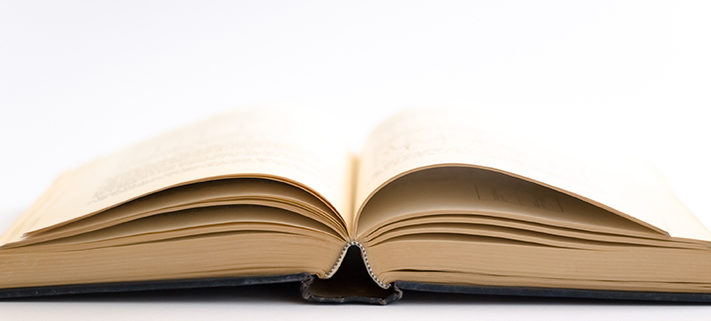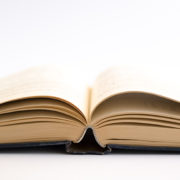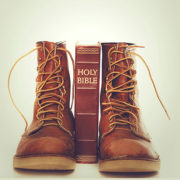Open your Catechism: Part 5
Forgiveness is a daily need for all Christians, and God provides that necessary gift freely.
John A. Braun
In the morning, we prepare for the day ahead. We usually have a regular routine that might include taking a shower, brushing our teeth, and putting on clean clothes for the day’s activities. The routine is different for everyone, but we all understand the process, and we have trained ourselves to do what we need to do each morning. We know that we get dirty every day. Some days are worse than others. So we clean up and go on.
Our spiritual life each day follows a similar pattern. Oh, yes, we do some things that our Savior might commend with the words, “Well done, good and faithful servant.” But we also know the failures and sins that drive us to hide from the face of God like Adam and Eve did in the Garden of Eden.
Those sins and failures soil us. Sometimes they burden us, but, as children of God, we do not cringe and hide. We know God’s love. He has made us his children and washed away our sins—cleansed us in the blood of Christ (1 John 1:7). So we come to him penitently asking, “Lord, have mercy!” He responds, “Friend, your sins are forgiven” (Luke 5:20). Our hearts and souls are washed, and we go on. It’s a pattern we know. It’s like cleaning up and getting ready for the next day—only spiritually.
God cleanses us
God knows we need the cleansing of his forgiveness, and he richly provides it. By faith in Jesus we are living stones in his church. And we are not alone. We all have the same need every day: the cleansing of forgiveness. Luther captured that idea in his Large Catechism: “Everything, therefore, in the Christian church is ordered toward this goal: we shall daily receive in the Church nothing but the forgiveness of sin through the Word and signs, to comfort and encourage our consciences as long as we live here” (LC 2:55).
How does God do that? He continues to give forgiveness
to us through the means of grace: the gospel in Word and sacrament. Washed by that forgiveness, we are ready to live as children of God. Luther again observed, “So, until the Last Day, the Holy Spirit abides with the holy congregation or Christendom. Through this congregation He brings us to Christ and He teaches and preaches to us the Word. By the Word He works and promotes sanctification, causing this congregation daily to grow and to become strong in the faith and its fruit, which He produces” (LC 2:53).
Baptism
You learned about the means of grace—perhaps long ago—so let’s review the lesson. For most of us, the gospel came first in Baptism.
Baptism is not simple water only. It is water connected with God’s Word. Once that combination occurs, Baptism gives forgiveness, life, and salvation. That’s God’s promise (Acts 22:16; 1 Peter 3:21). “In Baptism there is freely brought to everyone’s door such a treasure and medicine that it utterly destroys death and preserves all people alive” (LC 4:43). Baptism does not depend on us. We are not baptized because we believe and decide to love Jesus. God forgives first and works to give us faith by our baptism.
While apparently simple—water and God’s Word—Baptism is a profound means of grace. The wonder is that God does not withdraw the forgiveness he so freely offers. Each of us was baptized with the words, “I baptize you (your name: John, Jenny, Joe, or Kathy), in the name of the Father, and of the Son, and of the Holy Spirit.” Once you are baptized, God’s forgiveness is there with your name on it. He does not withdraw it even if you wander as a prodigal and abandon his forgiveness. It’s always there for you to take in faith—to return to if you fall away.
You can use your baptism daily to receive the forgiveness God has placed at your door. When troubled by sin, you can return to your baptism—repenting of your sins; asking God, “Have mercy on me;” and then remembering that God has washed your sins away. He has not abandoned you but gives you forgiveness. “So a truly Christian life is nothing other than a daily Baptism, once begun and ever to be continued” (LC 4:65).
The Keys and Confession
We are part of Christ’s church and come together regularly for cleansing so we can go on to live for Christ. When we come together for worship, God assures us of forgiveness. We come together as believers soiled by our sins. Together we confess our sins. We stand before God seeking his forgiveness, and he freely gives it to us when the pastor turns and says, “As a called servant of Christ and by his authority, I forgive you all your sins.”
The pastor also shares the gospel of forgiveness in other ways in our worship. We call him to do that in the Absolution, in the liturgy, and in his sermon. Through the gospel, the pastor announces that God places forgiveness before us, within reach of the faith he has created in our hearts. Sometimes our sins still make us feel dirty even after we hear the words of absolution. Then we have the option to come privately to the pastor or another Christian for forgiveness of those sins that trouble us.
In our daily life we have the same treasure of forgiveness to give to others. To our children when they sin and are troubled by disobedience. To our spouses we sometimes hurt and who also hurt us. To others who have sinned against us. Forgiveness announced in these situations is forgiveness from God.
The Sacrament of the Altar
The Lord’s Supper is a special treasure. We receive Christ’s body in, with, and under the bread and Christ’s blood in, with, and under the wine. We remember what his body and blood accomplished: our forgiveness. We receive what was “given” and “poured out for you for the forgiveness of sins.”
Luther makes a comment similar to his words about Baptism, “The treasure, indeed, is open and placed at everyone’s door, yes, upon his table. But it is necessary that you also claim it and confidently view it as the words tell you. This is the entire Christian preparation for receiving this Sacrament worthily” (LC 5:35,36).
In many ways, God abundantly gives us what we need the most: forgiveness, and with it life and salvation. He has set up, instituted, and founded the ways the gospel brings us the blessings of his grace. In the Sacrament of the Altar our faith reaches out and grasps what washes away sin and removes its guilt so that we can go on and live as forgiven children of God—washed and ready for each day’s challenges.
Assignment: Read through Luther’s exposition of Baptism, the Ministry of the Keys and Confession, and Holy Communion. When you attend worship, note how many times you are assured of God’s love and forgiveness for you.
John Braun, chairman of the Reformation 500 Committee, is the executive editor of Forward in Christ.
This is the fifth article in a six-part series on Luther’s Small Catechism.
SUBMIT YOUR STORY
Do you have a manuscript, idea, or story from your own life you’d like to share for use in Forward in Christ or on wels.net? Use our online form to share it to our editorial office for consideration.
SUBSCRIBE TO FORWARD IN CHRIST
Get inspirational stories, spiritual help, and synod news from Forward in Christ every month. Print and digital subscriptions are available from Northwestern Publishing House.
Author: John A. Braun
Volume 104, Number 2
Issue: February 2017
Copyrighted by WELS Forward in Christ © 2021
Forward in Christ grants permission for any original article (not a reprint) to be printed for use in a WELS church, school, or organization, provided that it is distributed free and indicate Forward in Christ as the source. Images may not be reproduced except in the context of its article. Contact us




